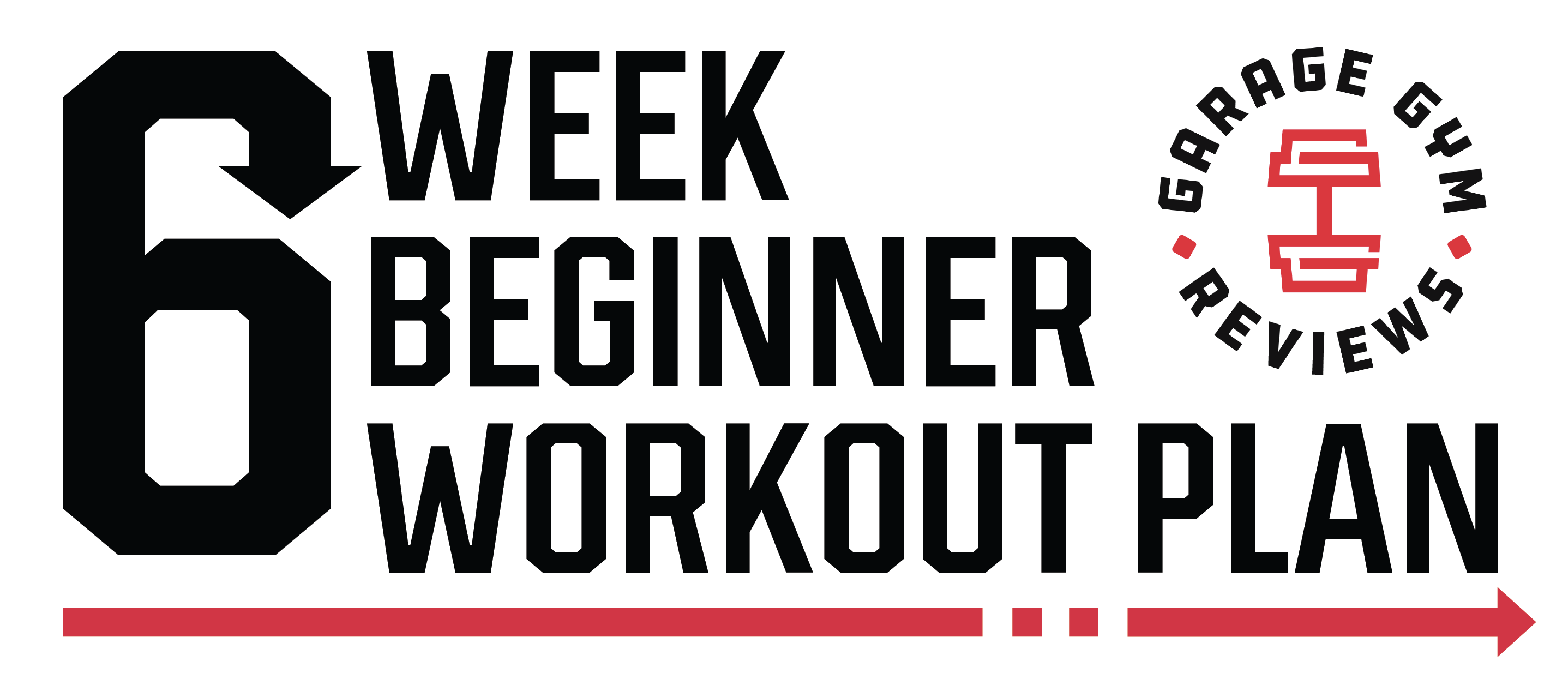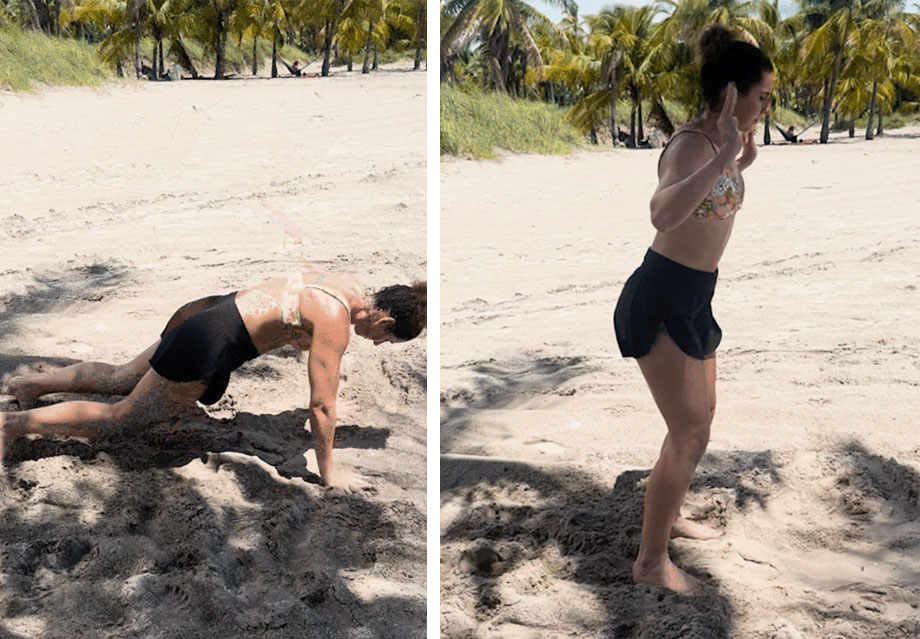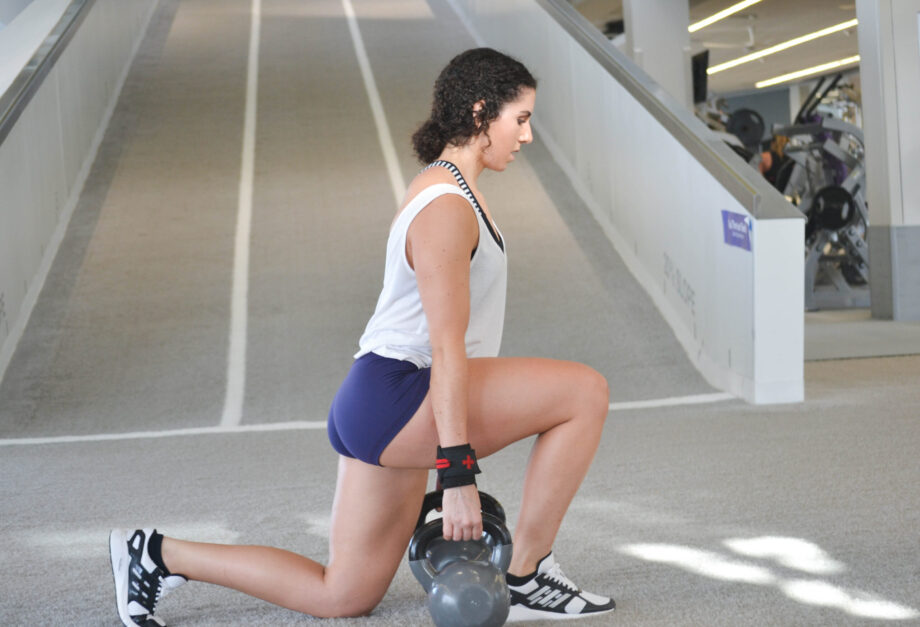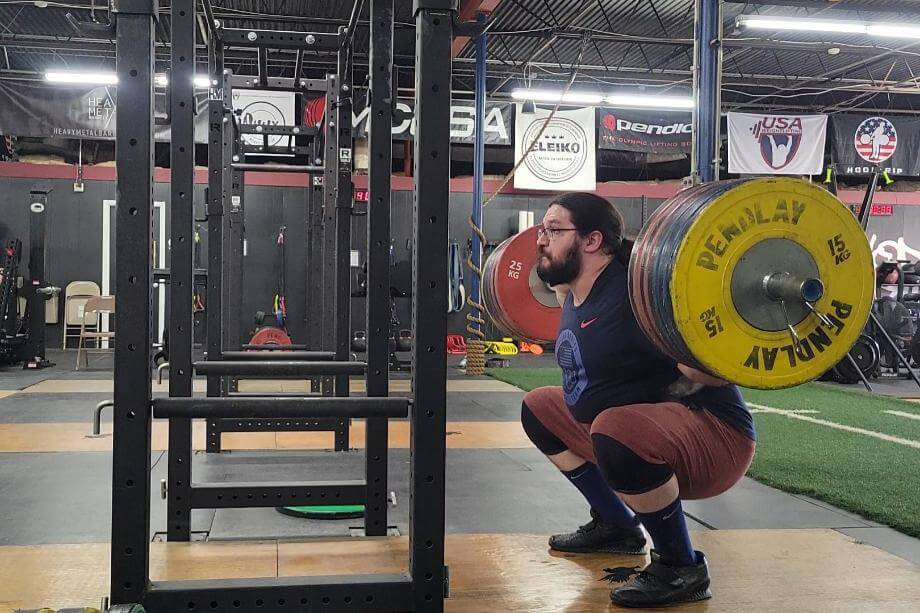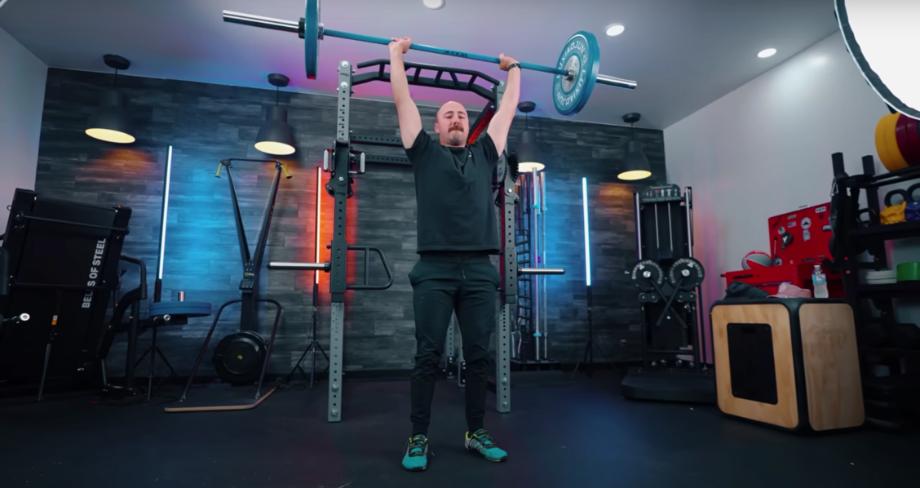Medical disclaimer: This article is intended for educational and informational purposes only. It is not a substitute for health or medical advice. For medical advice, contact an appropriate healthcare provider.
Are you new to weight training or plan to return to the gym after a long hiatus? First I’d like to say congratulations on starting this journey to a stronger you. That said, I know how difficult it can be to get started and choose the best online workout program to follow.
You’re in the right place because I’m a certified personal trainer, and one of my favorite groups of people to work with are beginners. In this six-week beginner workout plan, I’m going to show you how I like to progress complete beginners into seasoned exercisers.
What To Expect From Our Beginner Workout Plan
This workout program is broken down into two phases. The first phase consists of mastering key movements such as the hip hinge, pressing, squatting, and lunges using light weight for a low number of sets and reps. Once you perfect these movements you’ll move onto the second phase, which has the same moves but with more intensity and shorter rest periods.
Our beginner-friendly workout program is designed to help you build a foundation that you can build on to perfect your fitness goals, whether that’s increased endurance, adding muscle mass, or improving your overall functional fitness.
You will notice there are key movements and not a ton of variation—the goal is to practice the basics rather than trying something brand new every day.
Before we get started, it’s worth noting that if you are not headed to your local gym for this weight training routine, here is an idea of the gym equipment you’ll need for at-home workouts:

- Dumbbells
- Kettlebells (optional, you can sub for dumbbells)
- Mini loop resistance band
- Box or chair for dips
- Floor space
RELATED: Best Adjustable Dumbbells
6-Week Beginner Workout Overview
You have access to download the free 6-week workout plan as a PDF. Plus, if you keep scrolling you will also be able to read step-by-step instructions for each exercise featured in the plan below.
| Weeks | Day 1 | Day 2 | Day 3 | Day 4 | Day 5 | Day 6 | Day 7 |
|---|---|---|---|---|---|---|---|
| Week 1: | Full-body workout: 3 rounds | 20 mins of continuous movement | Lower-body workout: 3 rounds | Rest | Upper-body workout: 3 rounds | 20 mins of continuous movement | Rest |
| Week 2: | Full-body workout: 3 rounds | 20 mins of continuous movement | Lower-body workout: 3 rounds | Rest | Upper-body workout: 3 rounds | 20 mins of continuous movement | Rest |
| Week 3: | Full-body workout: add 5 reps to each set | 25 mins of continuous movement | Lower-body workout: add 5 reps to each set | Rest | Upper-body workout: add 5 reps to each set | 25 mins of continuous movement | Rest |
| Week 4: | Full-body workout: add 5 reps to each set | 25 mins of continuous movement | Lower-body workout: add 5 reps to each set | Rest | Upper-body workout: add 5 reps to each set | 25 mins of continuous movement | Rest |
| Week 5: | Full-body workout: 4 rounds | 30 mins of continuous movement | Lower-body workout:: 4 rounds | Rest | Upper-body workout: 4 rounds | 30 mins of continuous movement | Rest |
| Week 6: | Full-body workout: 4 rounds | 30 mins of continuous movement | Lower-body workout: 4 rounds | Rest | Upper-body workout: 4 rounds | 30 mins of continuous movement | Rest |
Full-Body Workout
- Kneeling quad stretch: 3 sets of 30 seconds
- Banded glute bridge: 3 sets of 25 repetitions
- Farmer’s carry: 3 sets of 40 seconds
- Dead bug: 3 sets of 5 repetitions per side
- Bent-over dumbbell row: 3 sets of 10 repetitions
Kneeling quad stretch
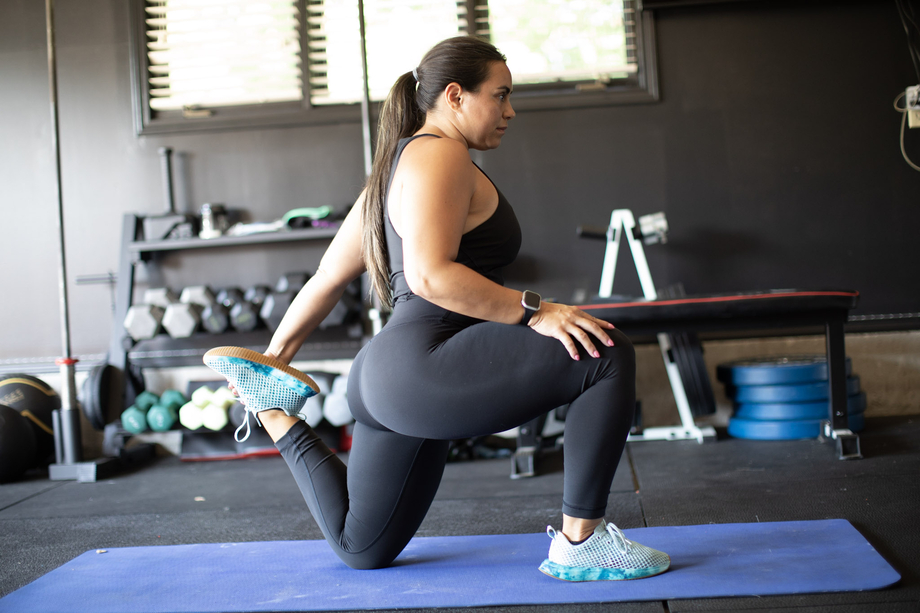
- Start in a kneeling position so that your shins are flat on the ground.
- Next, bring your left foot forward and place it flat on the floor so that your knee is bent and at a 90-degree angle.
- From there, squeeze your right glute and slowly lean forward until you feel a stretch in your right quad.
- Hold for 30 seconds.
Banded glute bridge
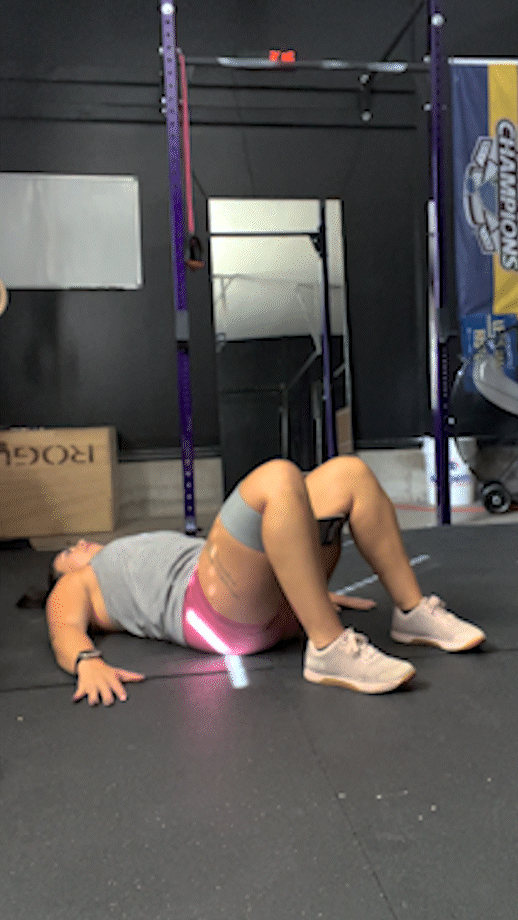
- Start by placing a mini-loop band around your thighs, just over your knees.
- Next, lie on your back with your knees bent so that your shins are vertical and your feet are shoulder-width apart and flat on the floor.
- With a neutral spine, push through your feet and lift your butt until you fully extend your hips.
- Flex the glutes at the top and hold the squeeze for 3 seconds before lowering your butt to the floor and repeat.
Farmer’s carry
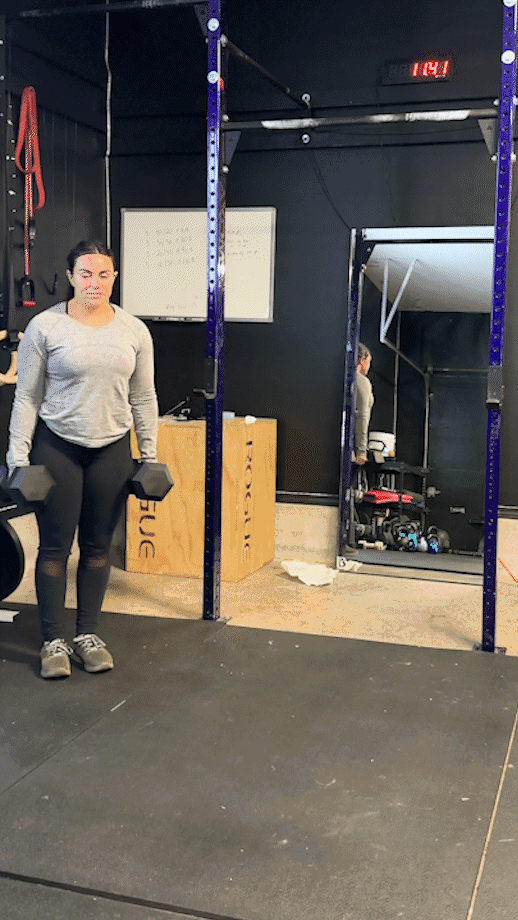
- Start by selecting two heavy dumbbells of equal weight and place one in each hand. Stand upright with your arms straight and the dumbbells at your sides.
- Keeping your shoulders back and down (think away from your ears) and your back straight, begin to walk forward in a straight line.
- You’ll walk for 40 seconds straight each set. You can turn around and use the same route as many times as needed in the 40 second bout.
Dead bug
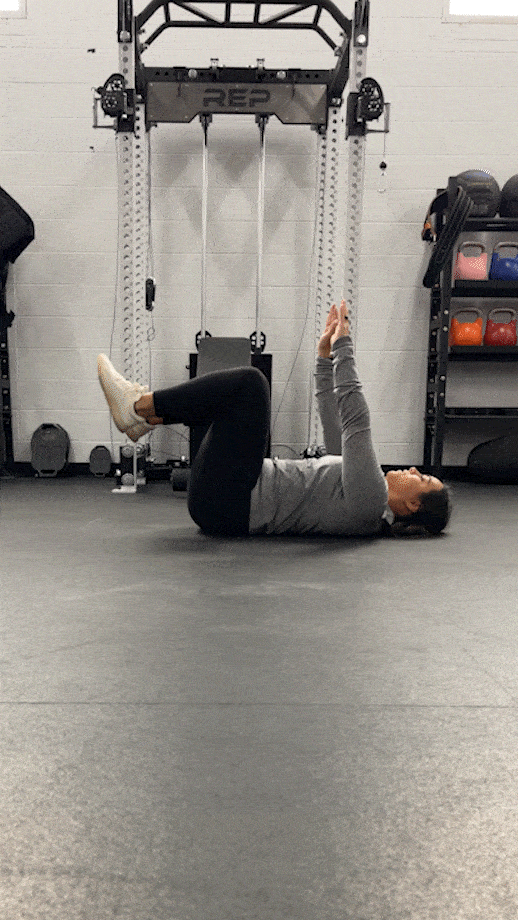
- Start lying on your back with your arms up towards the ceiling and your knees bent at a 90-degree angle (your quads will be perpendicular to the ground).
- Press your lower back into the ground. This should automatically tighten your core muscles.
- Slowly lower your right arm and left leg towards the ground, only reaching as far as you can without your lower back lifting from the floor (this keeps your core engaged).
- Return your arm and leg back to the starting position and repeat the movement on the opposite side, lowering your left arm and right leg towards the ground.
- Continue alternating sides for repetitions.
Bent-over dumbbell row
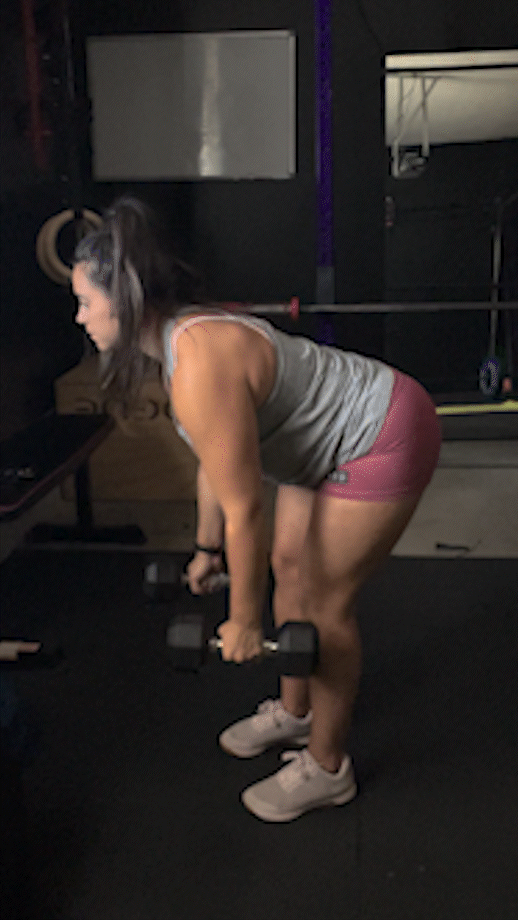
- Stand hip-width apart with a dumbbell in each hand and your arms by your sides.
- Tighten your upper back by squeezing your shoulder blades down and back.
- Hinge your hips so that your chest is mostly facing the floor and maintain your straight back position with a tight core.
- Stay in your hinged position and bend your elbows and squeeze your shoulder blades together to row the dumbbells toward your rib cage.
- Control the dumbbells as you lower your back toward your legs.
- Repeat for reps.
Upper-Body Workout
- Superman squeeze: 3 sets of 10 repetitions
- Low plank: 3 sets of 20 seconds
- Floor press: 3 sets of 10 repetitions
- Tricep dips: 3 sets of 15 repetitions
- Seated overhead shoulder press: 3 sets of 10 repetitions
Superman squeeze
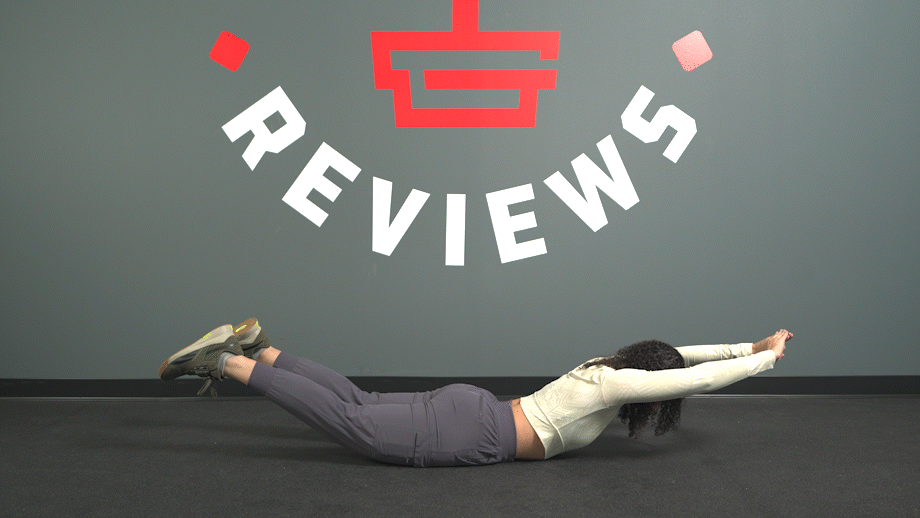
- inches off the ground at the same time. Keep your neck in a neutral position.
- While your arms are in air, squeeze your shoulder blades together and bend your elbows as if you’re pulling something toward your forehead.
- Hold the flex in your upper back for 3 seconds and squeeze your glutes at the same time.
- After the hold, return your arms out straight and lower your arms, chest, and legs back down to the ground.
- Repeat for reps.
Low plank
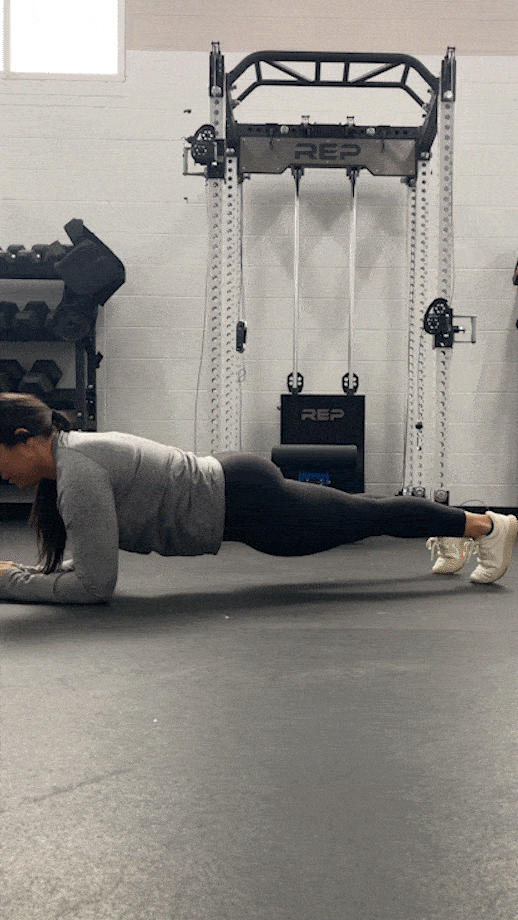
- Start in a prone position on your hands and knees, then lower your elbows to the floor so that your forearms are flat on the ground and parallel to each other.
- You’ll then begin to brace your bodyweight with your arms and core muscles and extend both legs so that they are both straight behind you.
- Keep your body fairly straight while you flex your glutes and hold the position.
- Hold for time. Remember to breathe.
Dumbbell Floor press
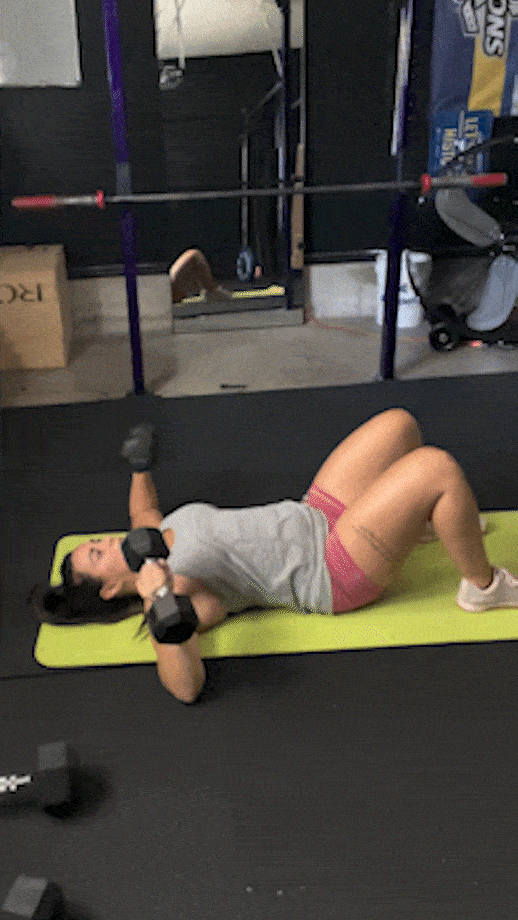
- It’s like a bench press, but on the floor! Start seated on the floor with your legs extended straight out.
- Grab a dumbbell with each hand and rest the dumbbells on your legs.
- From this position, you’re ready to roll on to your back and bring the dumbbells with you (using some momentum).
- From this supine position on your back and a dumbbell in each hand, tighten your back by squeezing your shoulder blades together and position your arms at shoulder level with your elbows resting on the floor, forearms vertical.
- Press the dumbbells toward the ceiling until you straighten (or mostly straighten) your arms, but not enough to lose the squeeze of your shoulder blades.
- Lower the dumbbells back down towards the ground being cautious to not slam your elbow on the floor.
- Continue for repetitions.
Tricep dips
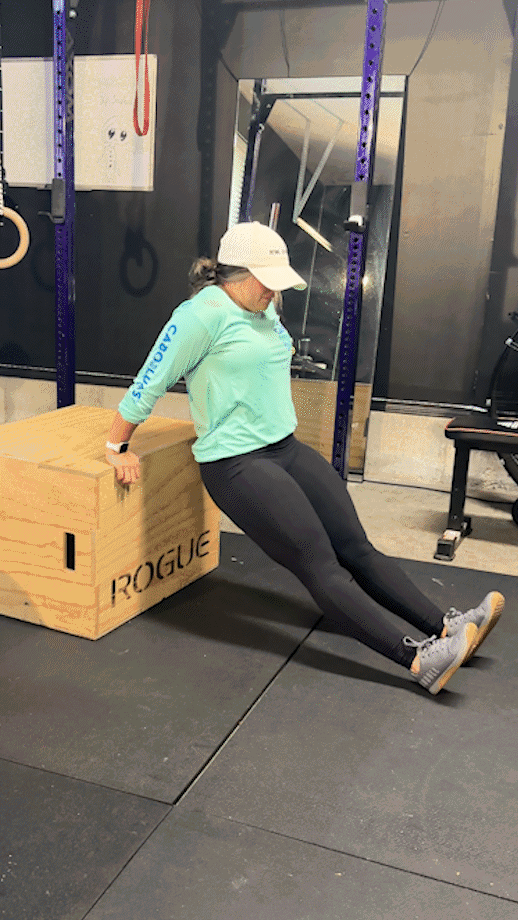
- Start by sitting on the edge of a bench or chair, with your hands on either side of your hips and fingers pointing forward.
- Lift your butt off the bench and walk your feet forward slightly until your knees are at a 90-degree angle and your arms are straight.
- Keep your shoulders down away from your ears at all times.
- Tighten your core muscles and bend your elbows, lowering your body towards the ground.
- Stop when your elbows are at a 90-degree angle, then press into your hands to extend your arms straight back to the starting position.
- Repeat for reps.
Seated overhead dumbbell shoulder press
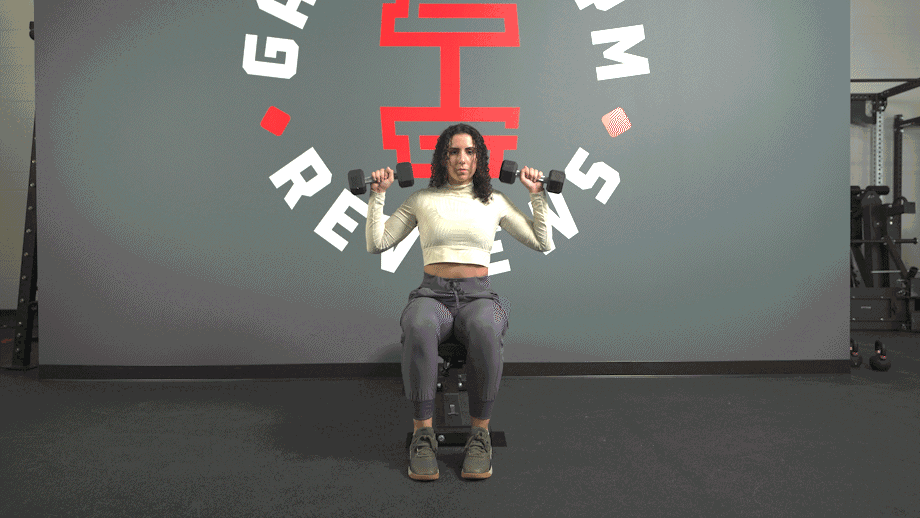
- Start by sitting on a bench or chair with your feet flat on the ground and your back straight.
- Hold a dumbbell in each hand (slightly above shoulder height) with your palms facing forward and your elbows at 90 degrees.
- Without arching your back (or shrugging your shoulders upward), press the dumbbells straight up towards the ceiling until you straighten your arms.
- Keep in mind the shoulder joint stays plugged into the shoulder girdle during the movement, so only your arms are moving, not your shoulders.
- Pause briefly at the top of the movement, then lower the dumbbells back down to shoulder height. Repeat for reps.
Lower-Body Workout
- Cat and cow: 3 sets of 5 repetitions per pose
- Clam shell: 3 sets of 10 repetitions per side
- Dumbbell Romanian deadlift: 3 sets of 10 repetitions
- Assisted reverse lunge: 3 sets of 5 repetitions per side
- Goblet squat: 3 sets of 10 repetitions
Cat and cow
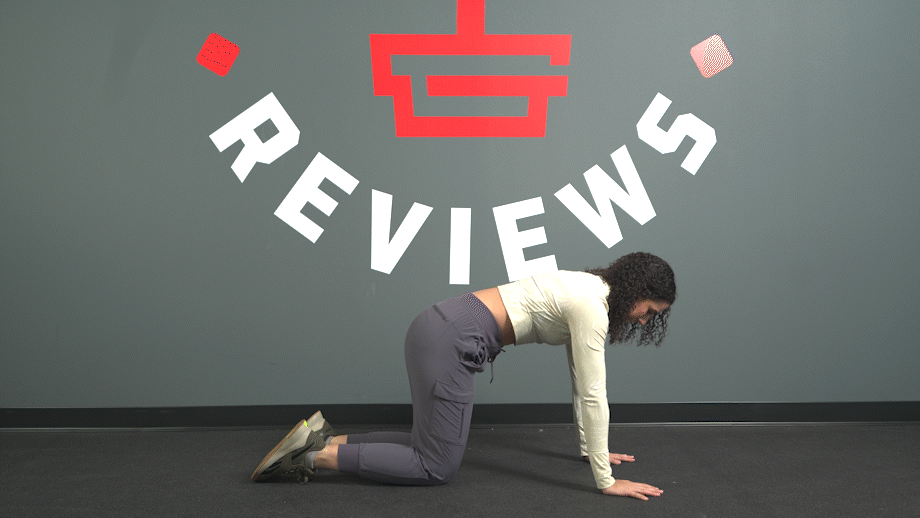
- Your shoulders are directly over your wrists and your hips are over your knees.
- To initiate the “cow” position, inhale and arch your back, focusing on your upper back, not just your lumbar spine.
- To transition into the “cat” position, exhale and round your spine, focusing on spreading the space between your shoulder blades.
- Transition between each pose slowly for reps.
Clam shell
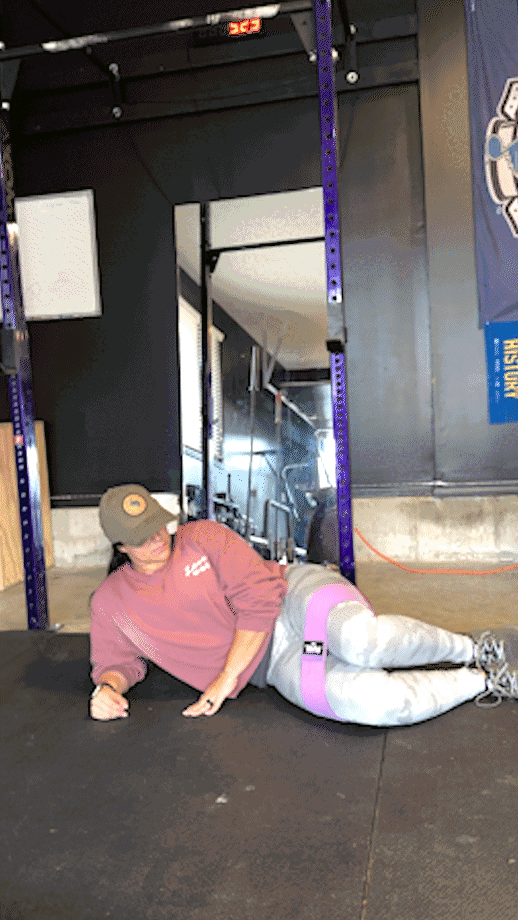
- Start in a side-lying position (pelvis perpendicular to the floor) with your knees bent and knees stacked.
- Keep your feet touching and lift your top knee away from your bottom knee without flexing your quads or moving your lower back or pelvis.
- Pause and hold at the top position of the movement for one second before lowering the top knee and repeating for repetitions.
- Repeat on the other side.
Dumbbell Romanian deadlift
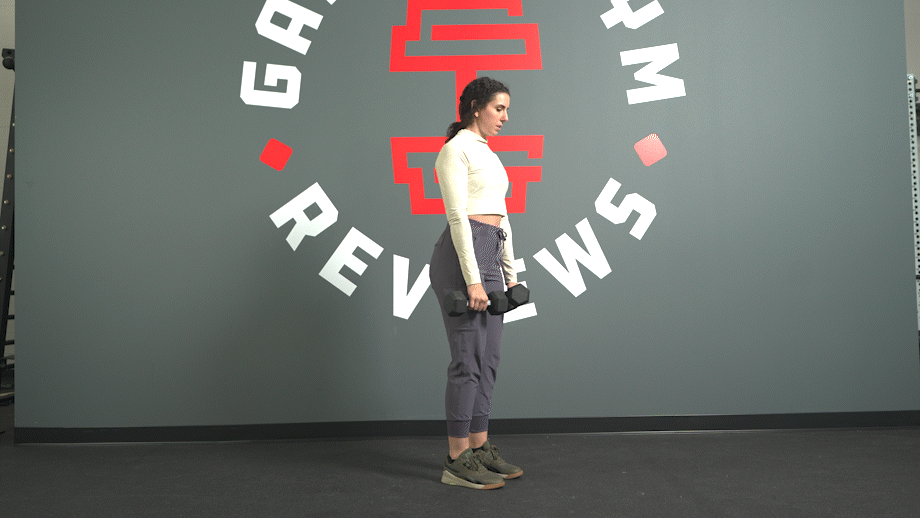
- With a dumbbell in each hand (and your hand at your sides) stand hip-width apart.
- Tighten your upper back by squeezing your shoulder blades down and back. You will need to maintain this straight back position during the whole set.
- Start hinging your hips back while maintaining a tigh upper back and a braced core.
- Keep your knees fairly straight (to engage your hamstrings) during the hinge and let your dumbbells lower as much as you can without losing the tightness of your shoulder blades.
- Flex your butt muscles to stand back up and keep your back straight.
- At the top of the motion, hold your glute flex.
- Repeat for reps.
Assisted reverse lunge
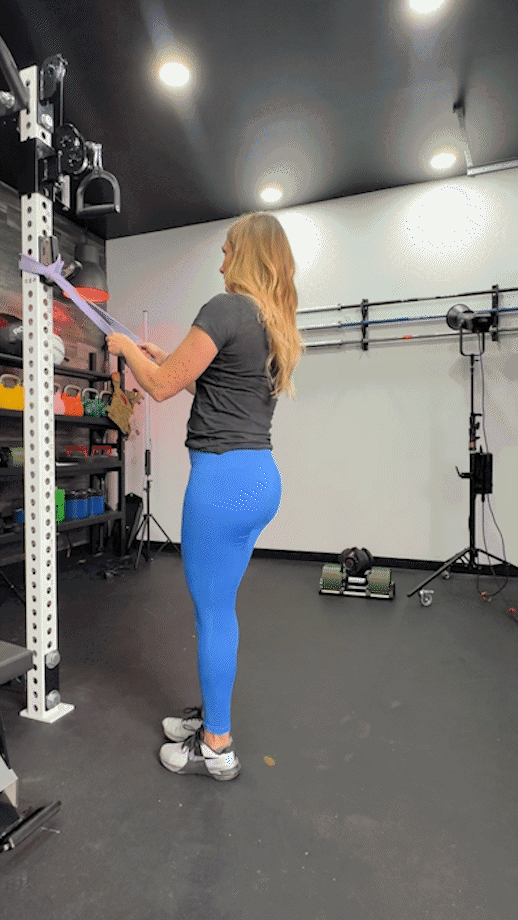
- Using a strap, dowel, or wall starting standing with feet hip-width apart and brace yourself on your object of choice.
- Keep your left foot planted and step backward with your right foot (specifically onto the ball of your right foot).
- Allow your right leg to bend and you lower your right knee toward the floor until both front and back legs each make a 90-degree angle.
- Keep in mind you’ll want your torso upright while you’re lowering down. Use the strap, dowel, or wall as much as needed to maintain an upright posture.
- At the bottom of the lunge, press into your left foot and flex your quad to initiate standing back up.
- Repeat all reps on one side before performing reps on the opposite side.
Goblet squat
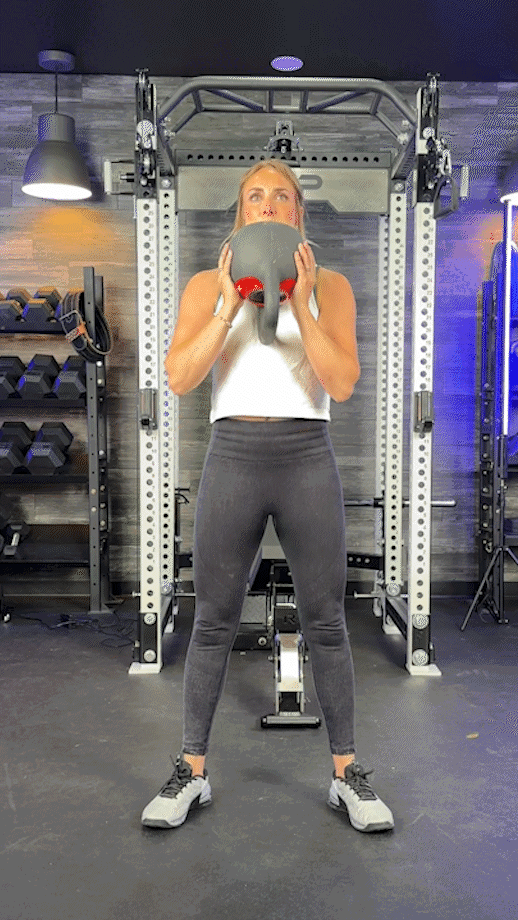
- Holding a single dumbbell at chest height, stand so your feet are hip-width apart.
- Start the squat by tightening your core and keeping your back straight and lowering your body by pushing your knees outward and lowering your hips.
- Keep lowering until lower until your thighs are parallel with the floor.
- From the bottom position, push into the floor with your feet and flex your glute and quad muscles to stand back up.
- Pause at the top and hold the flex before repeating for reps.
How The Beginner Workout Plan Progresses
Before we get into the strength portion, I want to point out that this workout plan has timed cardio workouts two days per week. You can choose whatever exercise you most enjoy (including walking, running, biking, swimming, or rowing) for the prescribed amount of time.
You’ll notice that the time increases by five minutes every two weeks. This is to keep challenging you just a little bit more with small, sustainable changes to help you achieve your fitness goals. Keep in mind this does not have to be an all-out effort—just something that keeps your heart rate elevated.
Now, let’s cover how you’ll make progressions on the strength exercises. During the first two weeks you’ll perform three sets of every exercise for the number of reps given. Keep in mind it’s okay to use light weights (or even just your bodyweight) during this period.
I encourage all of my clients to practice movements properly and safely before we start worrying too much about becoming a bodybuilder. You will have plenty of time in the future for muscle growth and building muscle strength.
The first two weeks are all about creating a foundation. Each workout starts with at least one warm up movement to help prepare for your strength training workout. You’ll also notice we split up the muscle groups with one full-body workout, one upper-body specific day, and one focused on the lower-body.
And speaking of warming up, if you’re not jiving with the warm-up drills on this plan, check out our curated list of 10 best warm-up exercises for more ideas.
The second two-week phase will use all the same exercises from the first two weeks, but it’s going to get just a little harder. For each exercise, you’re going to add five more repetitions to each set. It’s okay if in some exercises you can’t add all five reps yet, just do what you can and see if you can add just one more.
This is a progressive overload technique that helps with your overall strength. These small changes are put into place in small (and sustainable) baby steps.
The last two weeks of this beginner workout plan, the challenge increases again. In this last phase, you will perform four sets of every exercise instead of three. Do your best to perform the same amount of repetitions you completed in the last phase, too.
At the end of this six-week program, you’ll have a lot of repetitions under your belt and you will have slowly worked up your endurance and tolerance to perform more reps, higher weights, and more total sets.
Tips For Beginner’s Workouts
I often see beginners start a workout routine with the wind in their sails and endless excitement, but it fades before creating a long-lasting fitness habit. It’s a great way to start, but let me assure you that you won’t always be that excited to lift things up and put them down.
No matter how excited you are to get started in your strength journey, I think it’s best to have bite-size goals that are attainable over time. You will undoubtedly let yourself down if you set unrealistic expectations that are unattainable.
Here are some really simple things to keep in mind if you are a novice lifter and want to increase your overall fitness level:
- Baby steps are key to strength training success. Rome wasn’t built in a day—same can be said for your muscle size and strength.
- Rest is important—skipping rest days will not equate to a “more is better” result.
- Sleep is also rest, which cannot be overlooked. You’ll need sleep to perform well, increase muscle mass, and reduce body fat.
- Following a workout plan (this one or anything else you deem suitable) is always better than aimlessly going to the gym. A plan can help you stay on track and motivate you to see it through to the finish line.
RELATED: What is Active Recovery?
Beginner Workout Plan FAQ
What is a good beginner workout routine?
A solid beginner workout routine will be simple and easy-to-follow. It’s also essential that beginner workout plans are accessible for most folks to be able to dive right in and progress in difficulty over time.
Is working out three times a week enough for beginners?
Yes, beginners can make progress with fitness routines that focus on simple strength training workouts about three times per week. We also recommend additional movement like walking, running, biking, or swimming on your non-lifting days for overall cardiovascular health.
Can you lose weight by working out 30 minutes a day?
Daily exercise can help you increase muscle, reduce body fat, and change your body composition—all of which can contribute to weight loss.
However, your nutrition plays an even bigger factor when it comes to losing weight. That said, our nutrition experts here at GGR have tested and reviewed some of the best weight loss programs out there to help you navigate the endless static around diets and nutrition.
Is it better to work out in the morning or evening?
The time of day you workout will be more of a personal preference than a limiting factor on your success. That said, our experts have delved into the differences between morning vs evening workouts if you’re still not sure.


